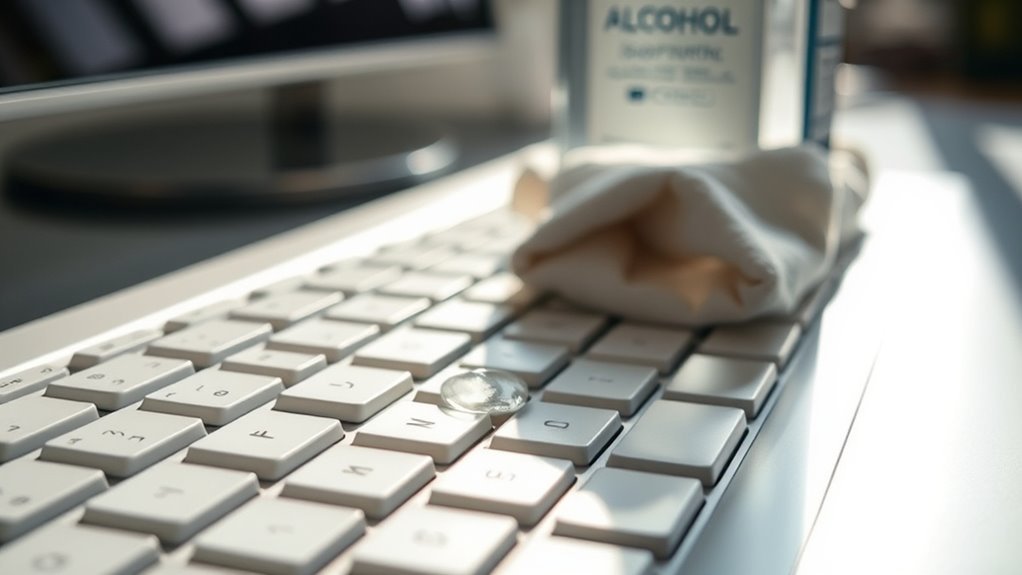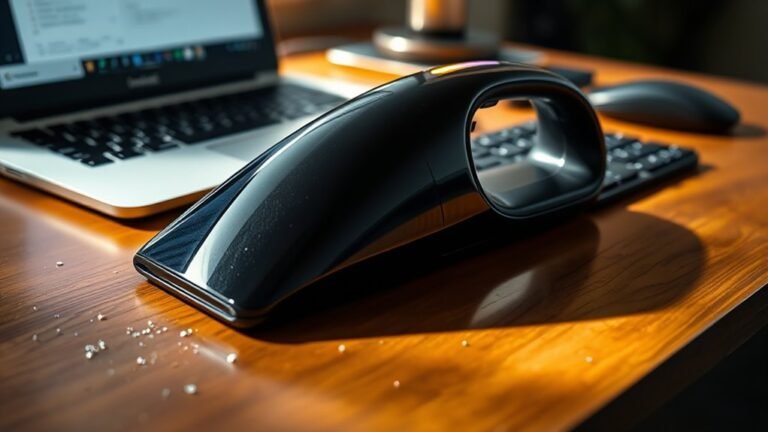Natural Cleaning Hacks for Your Keyboard
You can keep your keyboard clean naturally by gently brushing away crumbs with a soft-bristled brush and wiping surfaces with a damp microfiber cloth to remove dust and oils. For deeper cleaning, use a cotton swab dipped in isopropyl alcohol to disinfect between keys. Stubborn grime can be tackled with a mild baking soda paste applied carefully. Following simple maintenance tips will help you avoid buildup. Stick around to discover even more easy, natural ways to keep your keyboard spotless.
Using a Soft Brush to Remove Loose Debris

Before diving into deep cleaning, you should use a soft brush to gently sweep away loose debris from your keyboard. Choosing the right brush type matters—opt for ones with soft, natural bristles or specialized electronics brushes to guarantee keyboard safety. These brushes reach between keys without scratching or damaging delicate components. Avoid stiff or abrasive brushes that might compromise your keyboard’s surface or internal mechanisms. This simple step liberates your keyboard from dust and crumbs, giving you a fresh start without risking harm. By incorporating this gentle technique into your routine, you maintain your keyboard’s performance and extend its lifespan, empowering you with a clean, reliable tool that supports your freedom to work or play without interruption.
Cleaning With a Microfiber Cloth and Water
While you’ve cleared away loose debris, using a microfiber cloth dampened with water lets you gently wipe down your keyboard’s surface without causing damage. The microfiber benefits include trapping dust and oils efficiently, making your cleaning quick and effective. Just remember, minimal water usage is key—too much moisture can harm your keyboard. Lightly dampen the cloth and avoid spraying water directly.
| Step | What to Use | Tip |
|---|---|---|
| Wipe Surface | Microfiber Cloth | Use gentle, circular motions |
| Dampen Cloth | Water | Use just enough to moisten |
| Dry Keyboard | Dry Cloth | Verify no water remains |
This simple method frees you from harsh chemicals and keeps your keyboard fresh with natural care.
Utilizing Isopropyl Alcohol for Deep Cleaning

Once you’ve wiped away surface dust with a damp microfiber cloth, isopropyl alcohol can help you tackle deeper grime and disinfect your keyboard. Its fast-evaporating nature makes it perfect for deep cleaning techniques without risking moisture damage. Simply dampen a cotton swab or cloth with 70% isopropyl alcohol and gently clean between keys and crevices, breaking down oils and stubborn dirt. The isopropyl benefits include killing germs and leaving your keyboard hygienic and fresh. Remember to power off your device before you begin. Using isopropyl alcohol lets you reclaim control over your workspace’s cleanliness, freeing you from sticky, grimy keys. This simple step guarantees your keyboard stays in top shape, giving you freedom from buildup and boosting your typing experience.
Removing Stubborn Dirt With Baking Soda Paste
Tackle stubborn dirt on your keyboard by making a simple baking soda paste. Just mix two parts baking soda with one part water until you get a thick, spreadable cleaning paste. This DIY solution is safe, natural, and gives you control without relying on harsh chemicals. Apply the paste gently with a soft cloth or cotton swab, focusing on grimy spots and crevices. Let it sit for a few minutes to break down dirt, then wipe away with a damp cloth. Baking soda’s mild abrasiveness lifts grime without damaging your keys, freeing you from stubborn buildup. This method lets you refresh your keyboard naturally while staying true to your desire for effective, chemical-free cleaning hacks.
Employing Compressed Air Alternatives

If you don’t have canned compressed air on hand, there are effective alternatives you can use to blow out dust and debris from your keyboard. A simple, eco-friendly option is using a small, handheld manual air blower, often designed for camera lenses. This tool gives you control without relying on compressed air cans, freeing you from wasteful sprays. Another quick hack is to use a clean, dry paintbrush or soft-bristled brush to sweep away particles, especially in tight spaces. You can also try gently blowing through a straw to direct airflow precisely where you need it. These alternatives support your keyboard maintenance routine by keeping your device clean and functional, all while avoiding the restrictions and environmental impact of conventional compressed air products.
Disinfecting With Natural Essential Oils
Although cleaning removes visible dirt, disinfecting your keyboard with natural essential oils guarantees harmful germs are eliminated without harsh chemicals. You can create your own essential oil blends using tea tree, eucalyptus, and lavender oils—each offering powerful disinfecting benefits and a fresh scent. Simply mix a few drops with water in a spray bottle, lightly mist a microfiber cloth, and gently wipe your keyboard. This method frees you from relying on synthetic cleaners while ensuring your workspace stays hygienic. Plus, essential oils naturally combat bacteria and viruses, making your keyboard safer to use. Embracing essential oil blends not only supports your health but also aligns with your desire for a cleaner, chemical-free environment that respects your freedom to choose natural solutions.
Tips for Maintaining a Cleaner Keyboard Regularly
To keep your keyboard spotless, make a habit of removing dust daily and doing a deeper clean once a week. Simple hygiene habits, like washing your hands before typing, can also prevent grime buildup. These small steps will go a long way in maintaining a cleaner keyboard regularly.
Daily Dust Removal
A few minutes each day can make a big difference in keeping your keyboard free from dust and debris. By tackling dust accumulation regularly, you maintain keyboard hygiene without feeling trapped by a tedious chore. Here’s how you can keep your keyboard fresh and free effortlessly:
- Use a soft brush or microfiber cloth to sweep away surface dust.
- Blow gently between keys with compressed air or a simple breath.
- Keep your workspace clutter-free to prevent dust buildup.
- Avoid eating near your keyboard to reduce crumbs and grime.
These simple steps give you control and freedom from constant dirt, making your daily cleaning routine quick and satisfying. Embrace this small habit, and your keyboard will thank you with smooth, responsive keys every time.
Weekly Deep Cleaning
When you set aside time each week for a deeper keyboard cleaning, you’ll prevent stubborn grime from building up and keep your device functioning smoothly. Embrace weekly organization by unplugging your keyboard and gently removing keys with a keycap puller to access hidden dirt. Use a soft brush or microfiber cloth dipped in a natural cleaner—like diluted vinegar—to wipe every surface. Don’t forget to clean between keys with cotton swabs, ensuring no residue remains. While cleaning, take a moment to practice keyboard shortcuts that boost your productivity, freeing you from unnecessary clicks. This routine not only maintains a cleaner keyboard but also supports your desire for efficiency and freedom. Commit to this simple weekly habit, and your keyboard will stay fresh and responsive without hassle.
Preventive Hygiene Habits
Keeping your keyboard spotless week after week becomes easier if you adopt simple habits that prevent dirt buildup in the first place. By integrating effective preventive measures into your hygiene routines, you gain the freedom to work and play without distraction. Here are some easy habits to keep your keyboard clean:
- Wash your hands before using your keyboard to reduce oil and grime transfer.
- Avoid eating or drinking near your keyboard to prevent crumbs and spills.
- Use a keyboard cover that’s easy to remove and clean.
- Wipe down your keyboard with a microfiber cloth daily to catch dust before it settles.
Stick to these preventive measures, and your keyboard will stay cleaner longer, giving you more freedom to focus on what matters.
Frequently Asked Questions
Is It Safe to Use Vinegar to Clean My Keyboard?
You might wonder if vinegar is safe for keyboard safety. The good news is vinegar benefits include its natural antibacterial properties, making it a great cleaner. However, you shouldn’t apply it directly; always dilute vinegar with water and use a soft cloth to avoid damage. This way, you can enjoy a clean keyboard without risking harm, giving you the freedom to maintain your gear naturally and safely.
Can I Clean My Keyboard With Lemon Juice?
Did you know keyboards can harbor up to 400 times more bacteria than a toilet seat? Using lemon juice for your keyboard maintenance offers natural antibacterial benefits and a fresh scent. However, you’ve got to be careful—its acidity can damage some key materials if applied directly. Dilute lemon juice with water and use a soft cloth to clean. This way, you get lemon juice benefits without risking your keyboard’s longevity.
How Often Should I Clean My Keyboard for Optimal Hygiene?
You should stick to a regular cleaning frequency to keep your keyboard in top shape. Ideally, give it a thorough clean every one to two weeks, but if you eat at your desk or share your keyboard, you might want to clean it more often. For hygiene tips, use gentle natural cleaners to avoid damage and remember to unplug your keyboard first. Staying consistent with this routine helps you enjoy a cleaner, healthier workspace without feeling restricted.
Are There Any Natural Cleaning Methods for Mechanical Keyboards?
You want to clean without harsh chemicals, you want to protect your keys, and you want it done simply. For mechanical keyboard tips, try using a soft brush to remove debris, wipe with a cloth dampened in a mix of water and a little white vinegar, and use cotton swabs dipped in isopropyl alcohol for tight spots. These DIY cleaning solutions keep your keyboard fresh while letting you maintain control and freedom over your setup.
Can Natural Cleaning Solutions Damage My Keyboard’s Keys?
You might worry if natural cleaning solutions can damage your keyboard’s keys, but it really depends on your keyboard materials and cleaning frequency. Some materials like ABS or PBT plastics react differently to certain solutions, so you’ve gotta be careful with what you use. If you clean your keyboard too often or with harsh natural acids, you risk wear or discoloration. Stick to gentle, diluted mixes and moderate cleaning to keep your freedom to type without worry.






